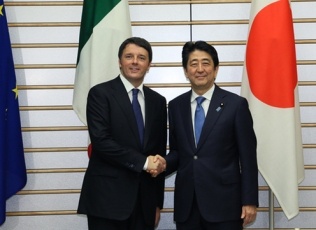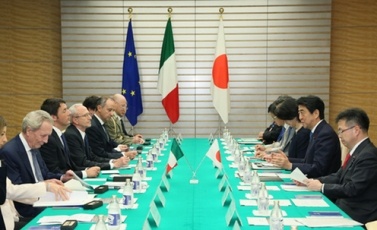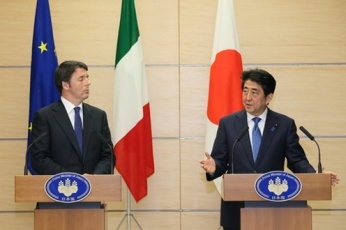Japan-Italy Relations
Japan-Italy Summit Meeting
 (Photo: Cabinet Public Relations Office)
(Photo: Cabinet Public Relations Office)
 (Photo: Cabinet Public Relations Office)
(Photo: Cabinet Public Relations Office)
 (Photo: Cabinet Public Relations Office)
(Photo: Cabinet Public Relations Office)
1. Opening Remarks
(1) Prime Minister Abe welcomed the visit to Japan by Prime Minister Renzi, who is a close friend of Prime Minister Abe, and congratulated him on the great success of the Milan Expo. Prime Minister Abe also stated that Japan would serve as the chair country of the G7 Summit next year and Italy would do so the year after that, and said that he intended to utilize this visit by Prime Minister Renzi and the 150th anniversary of the establishment of the diplomatic relations between Japan and Italy next year as opportunities for deepening the Japan-Italy relations in a broad range of fields.
(2) In response, Prime Minister Renzi stated that he was happy to be able to realize this visit to Japan, the goal of which was to strengthen the bilateral relationship, and hoped to visit Japan again on occasions such as the G7 next year and the 2020 Tokyo Olympics. Furthermore, Prime Minister Renzi expressed gratitude for the attendance of Prime Minister Abe’s spouse to the Milan Expo, and he hoped Prime Minister Abe would also visit Italy.
(3) The two leaders affirmed that they would coordinate and cooperate toward the success of the Ise-Shima Summit and the 150th anniversary of the establishment of the diplomatic relations between Japan and Italy next year.
2. Bilateral Relations
(1) Prime Minister Abe explained his growth strategy and emphasized that Japan had returned as a country which can enjoy growth, and Prime Minister Renzi noted that the two countries were similar in terms of attaching importance to promoting growth. The two leaders appreciated each other’s efforts, while affirming that both countries would contribute to the global economy through their economic growth.
(2) Prime Minister Abe welcomed the deepening of cooperation between the two countries in the economic field, including the holding of business discussions by mid-tier enterprises as well as small and medium-sized enterprises at the Milan Expo. He further stated that he hoped to expand cooperation between companies at the Italy-Japan Business Group meeting with high-level participation. In response, Prime Minister Renzi showed his support for the idea, and stated that he intended to dispatch a high-level delegation.
(3) Prime Minister Abe mentioned that there are 40 sister-city relationships between Japan and Italy, and this year marks the 50th anniversary of the establishment of the sister city relations between Kyoto City and Florence, where Prime Minister Renzi was once mayor. He also expressed hope that tourism exchanges would expand between Japan and Italy, which was specified as an important market in the Visit Japan Promotion in April. In response, Prime Minister Renzi expressed expectation that tourism activity between the two countries would further intensify.
3. The Relationship with the European Union (EU)
(1) The two leaders affirmed that they will both make the greatest possible effort to try to achieve an agreement in principle on the Japan-EU Economic Partnership Agreement (EPA) during this year, as well as the early conclusion of the Japan-EU Strategic Partnership Agreement (SPA).
(2) Prime Minister Abe requested Italy’s cooperation on abolishing or easing restrictions on importing food and other items produced in Fukushima Prefecture. Prime Minister Renzi explained that basically it was an EU issue, but that Italy also intended to make efforts as much as it can.
(3) The two leaders also exchanged views on the problem of Greece.
4. Politics and Security
(1) Prime Minister Abe explained that the “Legislation for Peace and Security”, which puts “Proactive Contribution to Peace” based on the principle of international cooperation into practice, and Prime Minister Renzi expressed support for Japan’s initiatives.
(2) The two leaders welcomed the agreement that had been reached on the substance on the Agreement between the Government of Japan and the Government of the Italian Republic on the Security of Information (https://www.mofa.go.jp/mofaj/press/release/press4_002365.html) which would contribute to further strengthening security cooperation between the two countries, and affirmed that they would cooperate toward the early conclusion of the Agreement.
5. Regional Affairs
(1) The two leaders affirmed that thorough adherence to the rule of law at sea, including in East Asia and the Mediterranean Sea, is in the common interests of Japan and Italy, and confirmed their coordination for that purpose.
(2) The two leaders also exchanged views on the Russia-Ukraine situations. They affirmed that any compromise would not be possible with regard to Ukraine’s independence and sovereignty, and shared the view that it is important to involve Russia in various international challenges, and to maintain dialogue with Russia including at the leader level.
6. Other
The two leaders noted that both countries have important responsibility as Japan and Italy will serve as the chair country of the G7 Summit next year and Italy will serve as the chair the year after that respectively, and shared the view that they would cooperate toward the success of the Ise-Shima Summit next year.

